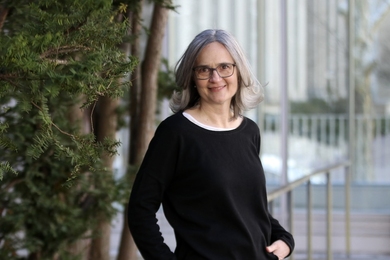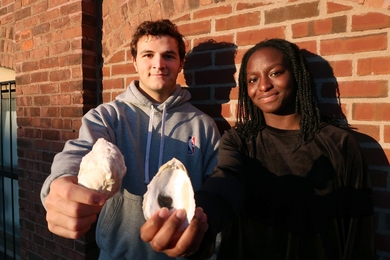Jerome H. Lemelson, America's most prolific living inventor, has established at MIT the $500,000 Lemelson-MIT Prize, the nation's largest prize for innovation and invention.
The prize is one element of a four-part, multimillion dollar program designed to foster innovation that will be administered by the internationally respected MIT economist, Lester C. Thurow, who has been named the first Jerome and Dorothy Lemelson Professor at MIT.
The announcements of the Lemelson-MIT Prize and of the establishment of the Jerome and Dorothy Lemelson Chair were made in New York Monday, Jan. 10, at a luncheon attended by Mr. Lemelson, MIT President Charles M. Vest, Provost Mark S. Wrighton, Sloan School Dean Glenn Urban and other MIT faculty, administrators, alumni/ae and supporters.
Mr. Lemelson is an independent inventor who holds approximately 500 patents, the most of any living American, and the fourth highest in the nation's history after Thomas Edison, MIT's Elihu Thomson and the late Edwin Land, founder of Polaroid and a Visiting Institute Professor at MIT.
The Lemelson Professorship is intended to foster innovation in the United States and to motivate students to pursue careers in invention and innovation.
"Innovation launched America as an industrial power," Dr. Vest said. "Rekindling the spirit of innovation is an essential part of America's quest to remain an economic superpower. This chair will give MIT the opportunity to spearhead initiatives that will help to foster inventions and innovations that clearly provide real-world benefits. Professor Thurow can provide extraordinary leadership in this regard."
The chair is part of MIT's longstanding commitment to fostering the spirit and development of technological innovation. A recent program with this goal, developed by Professor Thurow while dean of the Sloan School, is Regaining the Productive Edge (REPE). REPE will serve as a stimulus and support for MIT's students who have chosen innovation as a career path. Dr. Thurow established REPE, an outgrowth of MIT's report, Made In America, to study issues surrounding American productivity and competitiveness. REPE's goals include designing workable solutions and offering concrete policy recommendations as well as developing new strategies in order to increase America's productivity.
The Lemelson gift to MIT is part of a national program the inventor has established to spur innovation and invention in America in cooperation with prestigious institutions of higher learning. Late last year, he began a $3.2-million series of initiatives at Hampshire College. Hampshire is one of the nation's most distinctive liberal arts colleges.
In all, Mr. Lemelson has committed $10 million through the Lemelson National Program in Invention, Innovation and Creativity to stimulate the development of new inventions and innovative technologies, establish new businesses and encourage the nation's young to enter careers in invention and innovation.
"America's greatest natural resource remains American ingenuity," Mr. Lemelson said at the luncheon. Mr. Lemelson holds patents for inventions such as components of industrial robots, bar code scanning systems, cordless telephones, fax machines, VCRs and the magnetic tape drive used in the Sony Walkman tape player.
"We've established the Lemelson-MIT prize to encourage young people in this country to seek careers in invention and innovation-to inspire their ingenuity," Mr. Lemelson said.
$6.5 MILLION INITIATIVE AT MIT
The Lemelson-MIT prize is open to United States citizens and will be conferred for the first time in early 1995. It is part of a $6.5 million initiative that also includes the Jerome and Dorothy Lemelson professorship, lO research fellowships linked to the chair to support graduate students studying ways to increase innovation, and eight awards for undergraduate MIT students who have demonstrated achievement in inventiveness and innovation in any field.
"This prize and the program are significant to MIT," said Dr. Vest, "because the university was founded 133 years ago on the idea that it's important to develop new ideas and solutions to real-world problems. One of the ways we cultivate those ideas is by linking undergraduate students with MIT faculty in a wide range of innovative research activities."
Mr. Lemelson said he considered MIT "an ideal partner because of its longstanding commitment to fostering the spirit of invention and the development of technological innovation and the international respect it commands. The prize program and MIT's other commitments to stimulating invention can set a precedent that other influential American institutions can follow to ensure America's future economic success."
INNOVATION CRISIS
Mr. Lemelson believes that America is facing an innovation crisis because too few of its high school students are interested in careers in innovation. "A survey we commissioned just last week found that almost 75 percent of high school students would prefer to be in show business than be an inventor," he observed. "We must convince our nation's young people that the field of invention can be far more rewarding-financially and in other respects-than most of them think." He is committed to this mission because, "every new American inventor is a potential new American business. By growing our own technology and rewarding American inventors with protectable patents, we create jobs at home and capture revenue streams throughout the globe."
Professor Thurow, who has specialized in public finance, macroeconomics and income distribution, was a staff economist on the President's Council of Economic Advisors under President Lyndon B. Johnson. He believes that the public should have an understanding of economics, particularly as economics affects public policy. A prolific writer, he currently serves as economic columnist for The Boston Globe and "The Nightly Business Report," which appears on the Public Broadcasting Service. He has also served on the Editorial Board of The New York Times, has been a contributing editor for Newsweek and was a member of the Time Board of Economists. He received the Gerald Leob Award in 1983 for Economic Writing and the Champion Media Award for syndicated columnists.
When asked to comment on the luncheon and the events of the day, Mr. Lemelson smiled and simply said, "This was the best day of my life."
A version of this article appeared in the January 12, 1994 issue of MIT Tech Talk (Volume 38, Number 19).





